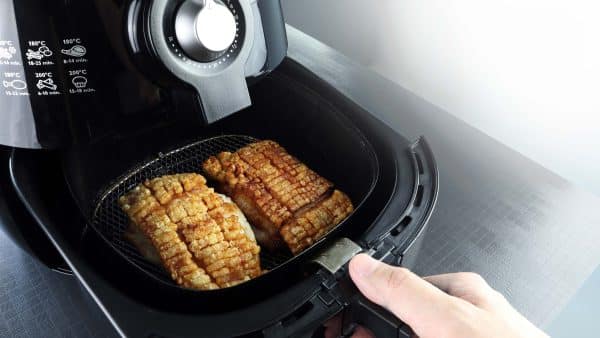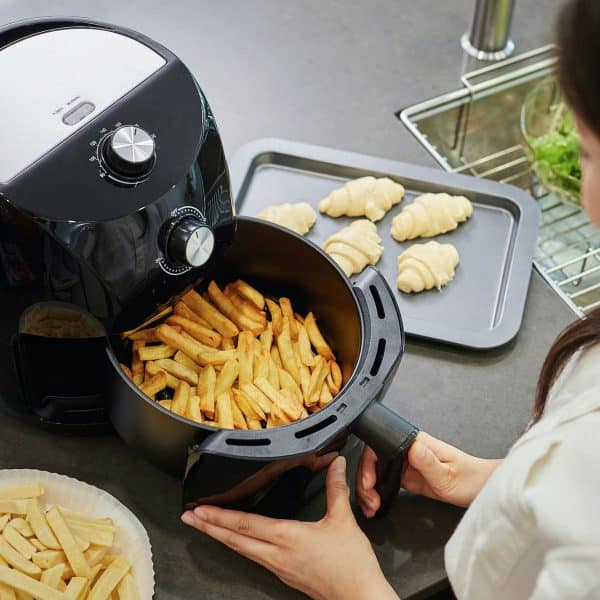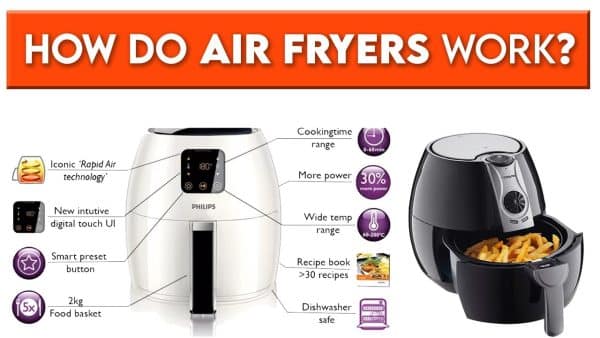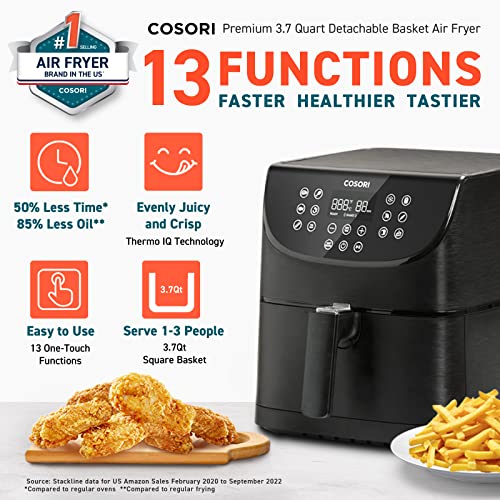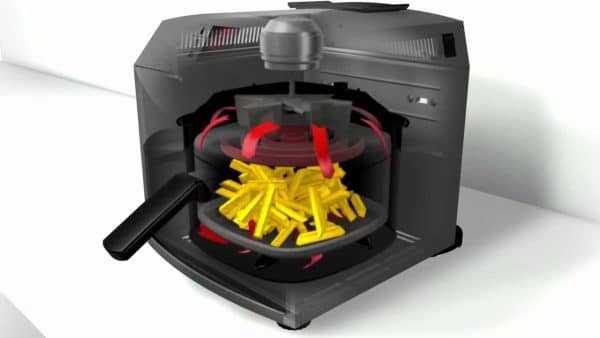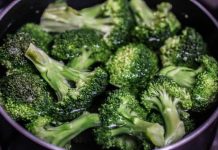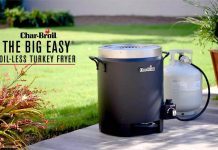So, you’ve heard about this kitchen gadget called an air fryer, but you’re not exactly sure what it is or how it works.
Well, let me tell you, it’s a game-changer! An air fryer is a device that uses hot air circulation combined with a minimal amount of oil to cook your food to perfection.
It creates that crispy, golden exterior that we all love without the excess grease and calories. This article examines the magic behind the air fryer and explores how it can revolutionize your cooking experience. Get ready to embark on a healthier and tastier culinary journey!
What is an air fryer?
Definition of an air fryer
An air fryer is a countertop kitchen appliance that uses hot air circulation to cook food. It is designed to mimic the cooking process of deep-frying. Still, with significantly less oil. Using a combination of high heat and a powerful fan, the air fryer cooks food quickly and evenly, resulting in crispy and delicious dishes.
Benefits of using an air fryer
Using an air fryer offers several benefits. Firstly, it allows you to enjoy your favorite fried foods with a fraction of the oil traditionally used. This makes air frying a healthier alternative, as it significantly reduces your meals’ calorie and fat content.
Additionally, air fryers are a more convenient option for cooking as they require less preheating time and are generally much easier to clean than traditional deep fryers. Lastly, the air frying process is known to be faster than conventional cooking methods, saving you time in the kitchen.
Popular brands of air fryers
When it comes to choosing an air fryer, there are several popular brands available in the market. Some top brands known for their quality and performance include Philips Air Fryer, Ninja Foodi, Cosori, Instant Vortex, and GoWISE USA.
These brands offer a variety of models with different sizes and features, allowing you to find the perfect air fryer to suit your needs and preferences.
How does an air fryer work?
Principle of air frying
The principle behind air frying lies in using rapid air circulation to cook food. An air fryer is equipped with a heating element and a fan. The heating element produces intense heat, which is then circulated by the fan throughout the cooking chamber. This hot air rapidly surrounds the food, creating a crisp outer layer while perfectly cooking the inside.
Components of an air fryer
To better understand how an air fryer works, it is essential to familiarize yourself with its components. The outer shell of the air fryer serves as a protective layer and helps retain heat. The cooking basket, usually made of non-stick material, holds the food and circulates the hot air around it. The heating element is responsible for generating the heat needed for cooking. The fan helps distribute the hot air evenly, ensuring thorough and efficient cooking. Lastly, the control panel allows you to adjust the temperature and cooking time according to the requirements of your recipe.
The heating mechanism in an air fryer
The heating mechanism in an air fryer utilizes an electric heating element to produce the required heat. This element is located near the cooking chamber and can reach high temperatures quickly. The air fryer also comes with an adjustable temperature control, allowing you to set the desired heat level based on the type of food you are cooking.
The rapid air circulation created by the fan ensures that the heated air reaches every corner of the cooking chamber, resulting in evenly cooked food. The hot air exhaust system releases excess moisture and prevents steam accumulation, ensuring crispy and perfectly cooked dishes.
Understanding the principle of air frying
Explanation of convection heating
Air frying relies on convection heating, which involves the transfer of heat through the movement of air. In a conventional oven, heat is radiated from a single source, typically at the bottom or top. However, in an air fryer, the heating element is placed closer to the food, allowing quicker and more efficient cooking. The fan continuously circulates the hot air, ensuring the entire food surface is exposed to heat and cooked evenly.
Role of circulated hot air
The circulated hot air plays a vital role in air frying. As the fan forces the hot air to rush, it creates a swirling effect within the cooking chamber. This swirling action helps distribute the heat evenly, ensuring that every part of the food is exposed to the hot air. This produces the desired crispy exterior and moist interior of air-fried dishes.
Comparison to traditional frying methods
Air frying offers several advantages over traditional frying methods. While deep-frying submerges food in oil, air frying only requires minimal oil, sometimes just a spritz of cooking spray. This dramatically reduces the calorie and fat content of the cooked food. Furthermore, air frying eliminates the mess and hassle associated with deep frying, as it does not involve oil splatters or the need for large amounts of oil for frying. Air-fried dishes are also known to have a lighter and less greasy texture than their deep-fried counterparts.
Components of an air fryer
Outer shell
The outer shell of an air fryer is typically made of heat-resistant plastic or stainless steel. It is a protective layer that prevents external heat from escaping and ensures the user’s safety. The outer shell also helps retain heat within the cooking chamber, allowing for efficient cooking.
Cooking basket
The cooking basket is an essential component of an air fryer. It is typically made of non-stick material, where the food is placed for cooking. The design of the cooking basket allows for proper air circulation around the food, ensuring even cooking and crispiness. Some air fryers come with a removable cooking basket, transferring the cooked food to serving dishes easier.
Heating element
The heating element is responsible for generating heat within the air fryer. It is usually located near the cooking chamber and can reach high temperatures quickly. The heating element heats the surrounding air, which is then circulated by the fan for efficient cooking.
Fan
The fan in an air fryer is responsible for circulating the hot air throughout the cooking chamber. As the fan spins, it creates a continuous flow of air that evenly distributes the heat, ensuring that every part of the food is perfectly cooked. The fan also helps remove excess moisture from the cooking chamber, allowing the food to crisp.
Control panel
The control panel lets you set your air fryer’s desired temperature and cooking time. It typically consists of buttons or a digital interface that allows you to adjust these settings based on the specific requirements of your recipe. The control panel may include additional features such as pre-set cooking functions, timers, and indicator lights.
The heating mechanism in an air fryer
Electric heating element
An electric heating element power the heating mechanism in an air fryer. This element is designed to quickly heat up and reach high temperatures, providing the necessary heat for cooking. The electric heating element is energy-efficient and ensures precise temperature control during the cooking process.
Adjustable temperature control
An air fryer has an adjustable temperature control feature, allowing you to choose the desired cooking temperature. The temperature range can vary depending on the model, but most air fryers offer various temperatures to accommodate various recipes. The ability to control the temperature ensures that your food is cooked at the optimal heat, resulting in perfectly cooked and delicious meals.
Rapid air circulation
Rapid air circulation is a crucial aspect of the heating mechanism in an air fryer. The powerful fan inside the air fryer spins at high speed, creating a cyclonic movement of hot air throughout the cooking chamber. This rapid air circulation helps cook the food evenly and quickly, ensuring it is correctly crisped on the outside and cooked thoroughly on the inside.
Hot air exhaust system
To prevent the buildup of excess moisture and maintain the desired texture of the food, air fryers are equipped with a hot air exhaust system. This system allows the release of steam and hot air generated during cooking. It ensures that the food remains crispy and avoids becoming soggy or steamed. The hot air exhaust system also contributes to the efficiency and effectiveness of the air frying process.
A step-by-step guide to using an air fryer
Preheating the air fryer
Before using your air fryer, it is recommended to preheat it. Preheating ensures the air fryer reaches the desired cooking temperature, producing evenly cooked and crispy food. The preheating time may vary depending on the model of your air fryer, so it is essential to refer to the manufacturer’s instructions.
Preparing the food
While preheating the air fryer, you can prepare the food you wish to cook. This may involve seasoning or marinating the ingredients according to your recipe. It is also essential to ensure that the food is cut into appropriate sizes for even cooking.
Placing the food in the cooking basket
Once the air fryer is preheated and the food is ready, carefully place the food into the cooking basket. It is important not to overcrowd the basket, which may hinder proper air circulation and result in uneven cooking. If you have more food, consider cooking them in batches to ensure that each piece receives sufficient heat.
Setting the temperature and cooking time
Set your food’s desired temperature and cooking time using the control panel. Refer to your recipe or the instructions provided with your air fryer for recommended temperature and time settings. It is essential to remember that air frying generally requires a higher temperature than other cooking methods, as the hot air quickly cooks the food.
Monitoring and flipping the food
It is recommended to check on the food during the cooking process to ensure it cooks evenly periodically. Some air fryers come with a built-in timer that will alert you when the cooking time is up. You can flip the food halfway through cooking to ensure even browning and crispiness.
Removing and serving the cooked food
Once the cooking time is complete, carefully remove the cooking basket from the air fryer. Use oven mitts or tongs to handle the hot basket safely. Transfer the cooked food to a serving dish and cool slightly before enjoying your air-fried creation. Remember to turn off the air fryer and unplug it once you have finished using it.
Tips for using an air fryer
Choosing the right cooking oil
While air frying requires minimal oil compared to traditional frying methods, choosing the right oil for optimal results is still important. When using oil, it is recommended to select oils with high smoke points, such as canola, avocado, or peanut oil. These oils can withstand high temperatures without breaking down or producing excessive smoke.
Ensuring proper air circulation
To ensure that your food cooks evenly and becomes crispy, it is essential to arrange the food in a single layer within the cooking basket. Avoid overcrowding the basket, as this can obstruct hot air circulation and result in uneven cooking. If necessary, cook your food in smaller batches to ensure that each piece receives sufficient heat.
Using the right temperature and cooking time
The temperature and cooking time settings may vary depending on the recipe or the type of food you are cooking. It is recommended to follow the temperature and time guidelines provided in your recipe or by the manufacturer of your air fryer. As you become more familiar with your air fryer, you can adjust these settings according to your preferences and desired crispiness level.
Shaking or flipping the food during cooking
To ensure even browning and crispiness, it is beneficial to shake or flip the food in the cooking basket during the cooking process. This helps expose different parts of the food to the hot air, resulting in a more uniform and delicious final product. However, be cautious when handling the hot cooking basket and use appropriate utensils or oven mitts to avoid burns.
Preventing overcrowding of the cooking basket
Overcrowding the cooking basket can hinder proper air circulation and affect cooking. It is essential to leave sufficient space between each piece of food to allow the hot air to circulate them. This will ensure that the food cooks evenly and achieves the desired crispiness. Consider cooking more food in multiple batches if you need to cook more food.
Cleaning and maintenance of the air fryer
Regular cleaning and maintenance are essential to maintain the performance and longevity of your air fryer. Allow the air fryer to cool completely before cleaning. Wash the cooking basket and other removable parts with warm soapy water or place them in the dishwasher if they are dishwasher-safe. Wipe the outer shell and control panel with a damp cloth. Removing any food residue or grease buildup is essential to prevent unpleasant odors and ensure optimal cooking results.
Comparison between air frying and traditional frying
Health benefits of air frying
One of the critical advantages of air frying is its health benefits. Traditional deep-frying involves submerging food in oil, resulting in high levels of fat and calories. In contrast, air frying requires significantly less oil, lowering calorie content. Air-fried dishes are also known to have a lower oil absorption rate, making them a healthier option without sacrificing taste and texture.
Differences in taste and texture
The taste and texture of air-fried food may differ slightly from that of traditionally fried food. While air-fried dishes have a similar crispy texture, they may lack the same level of greasiness associated with deep-fried food. However, many people find air-fried dishes’ lighter and less greasy nature a desirable alternative. The taste of air-fried food is often enhanced by the seasonings and marinades, resulting in flavorful and delicious meals.
Time and energy efficiency
Air frying offers time and energy efficiency compared to traditional frying methods. Preheating an air fryer takes significantly less time than preheating a conventional oven or deep fryer. The rapid air circulation in an air fryer allows for faster cooking times, reducing the cooking duration. Additionally, air frying requires less oil, saving both the time and energy required for heating and disposing of large amounts of oil.
Effort and convenience
Air frying offers a convenient and hassle-free cooking experience. Unlike deep frying, there is no need to monitor and adjust the temperature of a large pot of oil. Air fryers are also generally easier to clean than deep fryers, as they do not involve the disposal of large quantities of oil. The compact size and portability of air fryers make them suitable for small kitchens or those who prefer a more space-efficient cooking appliance.
Recipes and ideas for air fryer cooking
Air-fried chicken wings
Air-frying chicken wings is a widespread and delicious use of an air fryer. Coat the wings with your favorite seasonings or marinades, then place them in the cooking basket of the air fryer. Cook at a high temperature for around 25-30 minutes, flipping the wings halfway through to ensure even browning. The result is crispy, flavorful chicken wings, a healthier alternative to deep-fried versions.
Crispy french fries
Air fryers are known for producing perfectly crispy french fries. Cut the potatoes into desired fry shapes, toss them in oil, and season with salt and other desired seasonings. Place the fries in a single layer in the cooking basket and cook at a high temperature for around 20-25 minutes, shaking or flipping them halfway through. The result is golden-brown, crispy fries that will satisfy your cravings.
Vegetable spring rolls
Air frying is a great way to enjoy crispy and flavorful vegetable spring rolls without the excess oil. Prepare your spring rolls by filling them with vegetables and seasonings.
Brush the rolls lightly with oil and place them in the cooking basket. Cook at a high temperature for around 12-15 minutes, flipping them halfway through. The air fryer will give you perfectly crispy and delicious spring rolls.
Fried fish
Air-frying fish is a healthier option than deep-frying while achieving a crispy and moist result. Season your fish fillets with desired spices and coat them in a light layer of breadcrumbs or batter.
Place the fillets in the air fryer cooking basket and cook at a medium-high temperature for 10-15 minutes, flipping them halfway through. The result is perfectly cooked fish with a crispy exterior.
Sweet potato chips
Air-fried sweet potato chips are a tasty and nutritious snack. Slice the sweet potatoes into thin rounds or strips, toss them in oil, and season with salt or other spices.
Arrange the chips in a single layer in the cooking basket and cook at a medium-high temperature for around 15-20 minutes, flipping them halfway through. The air fryer will give you crispy and addictive sweet potato chips.
Healthy dessert options
Air fryers are also great for making healthier dessert options. Try air-frying fruit slices, such as apples or peaches, with a sprinkle of cinnamon and a touch of honey. Cook at a medium temperature for around 8-10 minutes until the fruit is soft and slightly caramelized.
You can also make guilt-free churros by using a dough made with whole wheat flour and air-frying them until golden brown. The possibilities for healthier desserts in an air fryer are endless.
Conclusion
In conclusion, an air fryer is a versatile and innovative kitchen appliance that allows you to enjoy delicious and crispy dishes with significantly less oil and fat. The principle of air frying relies on rapid air circulation, which evenly cooks the food while creating a desirable crispy texture.
With its various components and heating mechanisms, an air fryer offers convenience, time efficiency, and health benefits. The possibilities for air fryer recipes are endless, from perfectly cooked chicken wings to crispy sweet potato chips.
As air fryer technology continues to evolve, we can expect further advancements in functionality and features, making it an increasingly popular choice for health-conscious individuals and those seeking a more convenient and efficient way of cooking.


